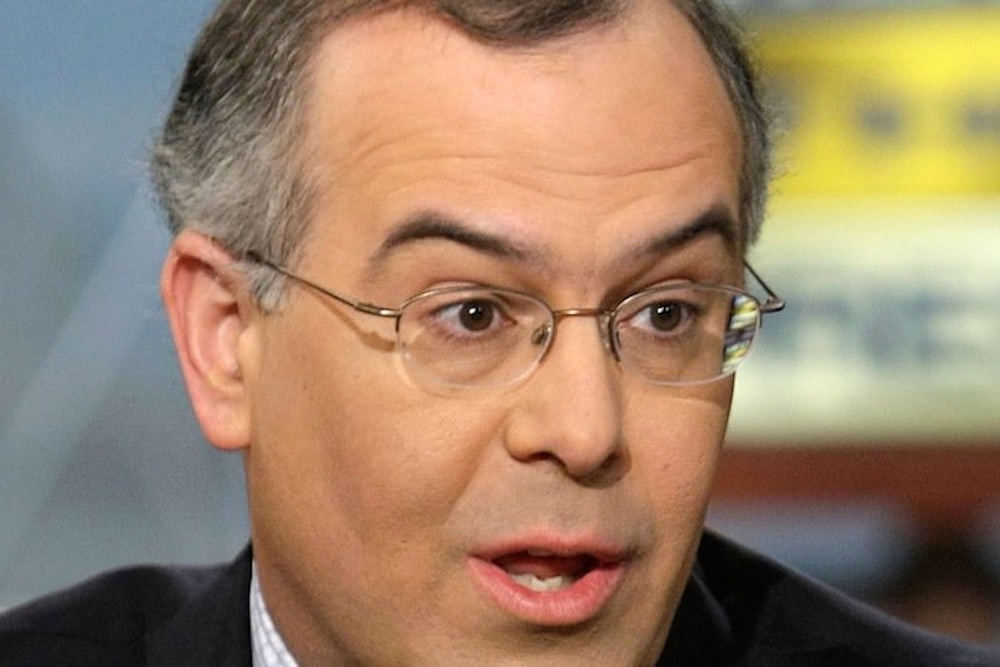There is a lot that David Brooks gets wrong in his much, much, much reviled New York Times column today. For example, his first sentence is wrong: It declares National Security Agency leaker Edward Snowden “the ultimate unmediated man” by virtue of the fact that he did not graduate high school and did not see his mother much. The computer guy who had cushy jobs with the CIA, the National Security Agency, and Booz Allen is the “ultimate unmediated man”? More than, say, the poor young man from an inner city, half of whose friends are in jail because of a senseless drug war?
From that false premise stem all sorts of things Brooks gets wrong. Brooks accuses Snowden of betraying just about everybody and everything: “honesty and integrity,” “his friends,” “his employers,” “the cause of open government,” “the privacy of us all,” “the Constitution.” Brooks’s fatal fallacy is to hold Snowden responsible for being unaccountable to the institutions that surround him—and surround all of us—rather than to question whether those institutions, state and non-state, personal and impersonal, have earned our accountability. Did Snowden fail them, or was he failed by them? That Brooks does not even consider the latter is a symptom of the conservative spin Brooks is trying to put on an empirical fact: Americans’ decline of trust in authority.
But it is hard to disagree with Brooks when he describes that empirical fact. As he puts it, Snowden “appears to be a product of one of the more unfortunate trends of the age: the atomization of society, the loosening of social bonds, the apparently growing share of young men in their twenties who are living technological existences in the fuzzy land between their childhood institutions and adult family commitments.”
And it is similarly difficult to dispute the consequences of this situation as Brooks elucidates them:
If you live a life unshaped by the mediating institutions of civil society, perhaps it makes sense to see the world a certain way: Life is not embedded in a series of gently gradated authoritative structures: family, neighborhood, religious group, state, nation and world. Instead, it’s just the solitary naked individual and the gigantic and menacing state.
This lens makes you more likely to share the distinct strands of libertarianism that are blossoming in this fragmenting age: the deep suspicion of authority, the strong belief that hierarchies and organizations are suspect, the fervent devotion to transparency, the assumption that individual preference should be supreme. You’re more likely to donate to the Ron Paul for president campaign, as Snowden did.
Poll after poll after poll has shown that Americans of both political persuasions have experienced a recent crisis of trust in larger institutions, both governmental and otherwise. If you are a conservative, like Brooks, you use Burkean buzzphrases like “mediating institutions” and “civil society” to blame individuals for not living up to personal responsibilities.
But the liberal version of this critique exists, too. It can be found in places like George Packer’s new book, The Unwinding, which blames government and other big institutions for not providing the social safety net they once did: “The unwinding of his title,” reports Michael Tomasky, “is the dissolution of those old civic bonds, and the steady work and ticket to middle-class security they provided for two or three post-war generations of Americans.” To Brooks, government is not the solution, rather the individual is; to Packer, government is the solution, and “the unwinding” is in part the result of the Obama administration having failed to implement an economically progressive government. (“This rot-at-the-top theory doesn’t really explain” most of these problems, complained a conservative New York Times columnist who reviewed Packer’s book.)
More polemically, on the right, writers like Yuval Levin (who wrote a dissertation praising Burke) blame liberal government for taking out at the knees mediating institutions like religious schools and charities. And on the left, writers like Corey Robin (who wrote a book condemning Burke) accuse conservatives of using these mediating institutions to compel obeisance to a retrograde status quo, as indeed Robin did today vis-à-vis Brooks.
It is not to say that both sides are equally right—I’d align myself more with Packer than with Brooks, for instance—to admit that this is a legitimate and worthwhile debate. So if you want the real answer to the question Brooks’s column tries to answer—why did Snowden leak?—take a look at what Snowden himself told The Guardian’s Glenn Greenwald: “I got hardened,” he said, because "Obama advanced the very policies that I thought would be reined in.”
Whether Snowden betrayed us or we betrayed Snowden is a fundamental ideological question. But what Snowden found so dispiriting was that a Democratic president would be apt, on issues like privacy and national security, to agree with Brooks.
Marc Tracy is a staff writer at The New Republic. Follow him on Twitter @marcatracy.
Correction: A previous version of this article called George Packer's new book The Great Unwinding. It is simply The Unwinding.
